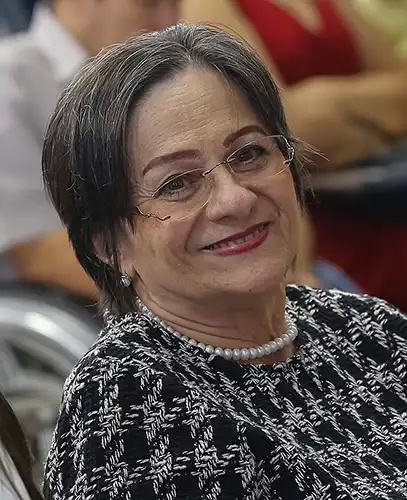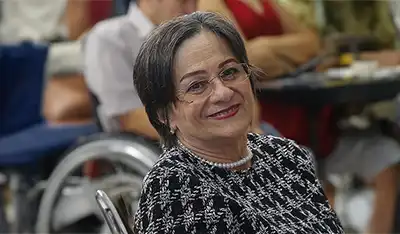
Maria da Penha Maia Fernandes is a Brazilian biochemical pharmacist and women’s rights activist. She became a symbol of the fight against domestic violence in Brazil.
Born in Fortaleza on February 1, 1945, she graduated in 1966 from the Federal University of Ceará. In 1977, she completed her master’s degree in Parasitology in Clinical Analysis at the University of São Paulo (USP).
Maria da Penha married Colombian Marco Antonio Heredias Viveros in 1976, whom she met when they were both studying at USP. They moved to Fortaleza after the birth of their first daughter and after Maria da Penha finished her master’s degree.
The husband, previously kind, polite and supportive of everyone around him, became violent and intolerant towards his wife and daughters. His violence became increasingly frequent until, in 1983, he tried to kill her twice.
On the first attempt, he shot her in the back while she was sleeping, leaving her paraplegic. Marco Antonio claimed that this had happened in an attempted robbery. Four months later, after surgeries and treatments, Maria da Penha returned home. Then, Marco Antonio locked her inside their home for 15 days. Then, he tried to electrocute her while she was taking a shower.
Trials
Marco Antonio’s first trial only took place in 1991. He was convicted and sentenced to 15 years in prison. With the legal recourses requested by the defense, he was not arrested. The second trial was held only two years later, when he was again convicted and given a sentence of 10 years and 6 months in prison. Again, alleging procedural irregularities, the defense managed to keep him out of prison.
In 1998, while Marco Antonio was still free, the case gained international attention. The case was reported to the Inter-American Commission on Human Rights of the Organization of American States (IACHR/OAS). The complaint was made jointly by Maria da Penha, the Center for Justice and International Law and the Latin American and Caribbean Committee for the Defense of Women’s Rights.
Even after the complaint, the Brazilian government remained silent, not commenting at any time during the process. In 2001, after receiving four letters since 1998, the State was held responsible for negligence, omission and tolerance in relation to domestic violence suffered by women in Brazil.
Only in 2002, shortly before the crime expired, Marco Antonio was tried again and sentenced to just 8 years in prison. He served only a third of his sentence and was released in 2004.
Maria da Penha Law
Maria da Penha’s case became a milestone in the fight against domestic violence in Brazil. Several organizations defending women’s rights joined her. Together, they fought for justice by demanding legislative changes and drafting laws to combat domestic violence against women.
In August 2006, president Luiz Inácio Lula da Silva sanctioned law N. 11,340. The law was named by the Federal Government as the Maria da Penha Law. The name of the law was a recognition of her fight to combat domestic violence against women. The law, considered one of the most comprehensive laws in the world against domestic violence, increased punishment for offenders, created specialized courts and provided better support and protection for victims.
Maria da Penha’s resilience and determination made her an emblematic figure in the fight against domestic violence, not only in Brazil, but also internationally. She continues to advocate for women’s rights and the eradication of gender-based violence.

